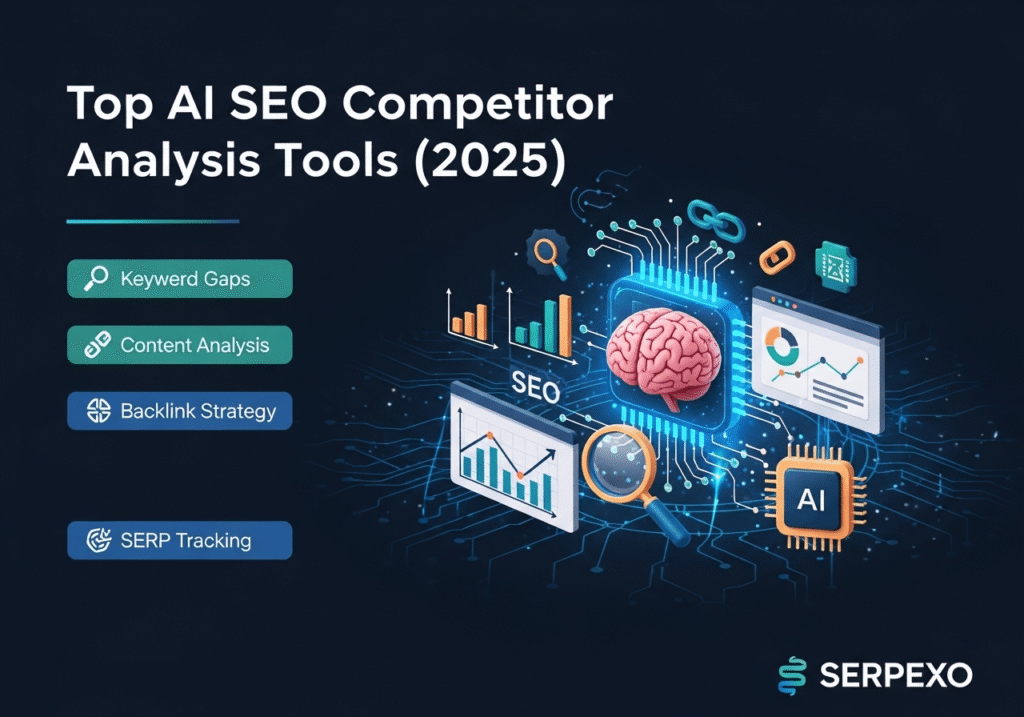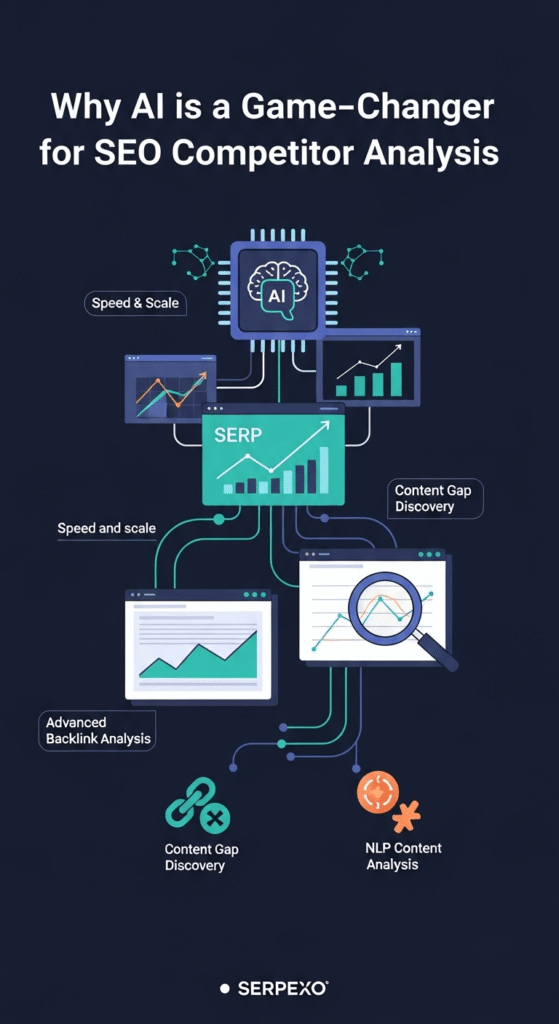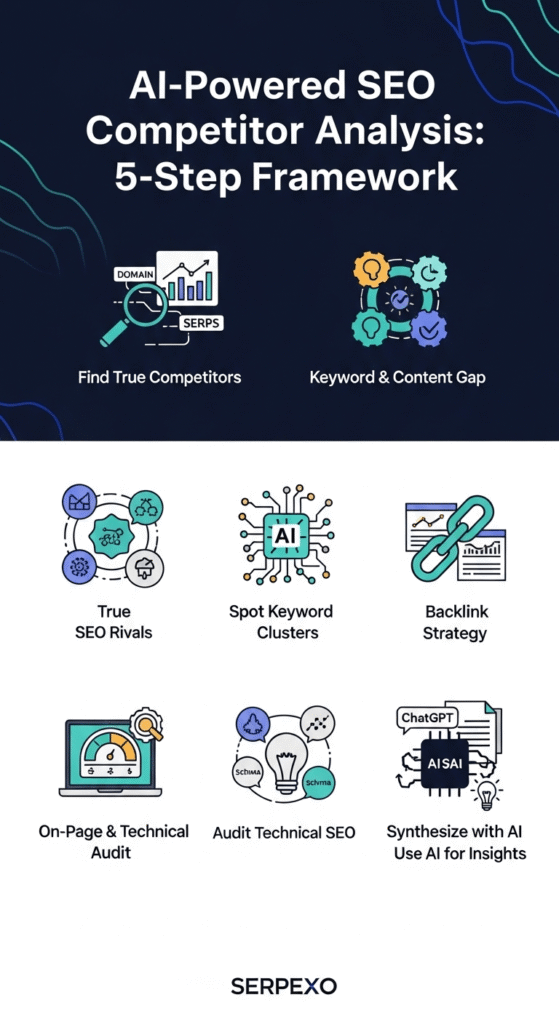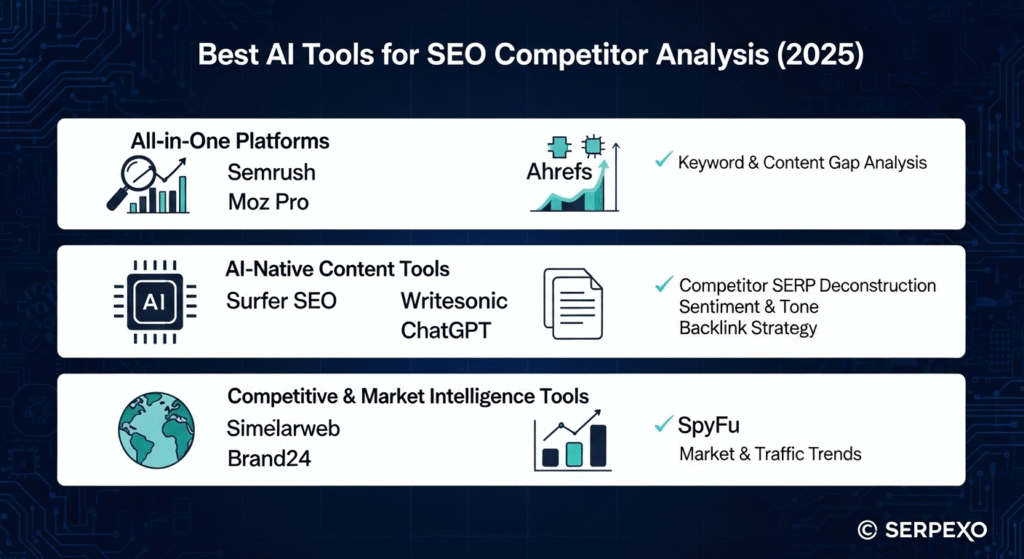
In the fiercely competitive world of today’s SEO, merely tracking keywords isn’t enough to get ahead of your competitors. Gaining a strategic edge requires a comprehensive grasp of all their activities, including their content triumphs, backlink approaches, and any weaknesses you can exploit. In the past, marketers dedicated endless hours to manually comb through vast amounts of data. Thankfully, technological advancements have transformed this arduous process.
Artificial intelligence (AI) has revolutionized the process of competitor analysis, turning what was once a daunting and time-consuming task into a significant strategic advantage. AI-driven tools have the capability to swiftly analyze massive datasets, identifying patterns and trends that might go unnoticed by human analysts. These tools provide actionable insights that have the potential to completely reshape and enhance your SEO strategy, enabling you to stay ahead of the competition effortlessly.
This guide offers much more than a simple list of tools. We will dive deep into the top AI-powered tools specifically designed for SEO competitor analysis, thoroughly examining how their unique AI capabilities provide you with a competitive advantage. Additionally, we will offer a detailed, step-by-step framework on how to effectively apply these insights to enhance your SEO strategy.
Why AI is a Game-Changer for SEO Competitor Analysis

Before delving into the specific tools, it is essential to grasp the reasons why AI is transformative for competitor analysis in SEO. Traditional methods are typically slow and can lack depth, being somewhat superficial. In contrast, AI significantly enhances your analytical capabilities by offering:
- Speed and Scale: AI algorithms have the ability to process and analyze vast amounts of data, spanning millions of data points. From analyzing search engine results pages (SERPs) to tracking social media mentions and scrutinizing backlink profiles, AI accomplishes all this in the brief time it takes to make a cup of coffee.
- Comprehensive Content Analysis: By leveraging Natural Language Processing (NLP), AI dives far beyond traditional keyword density evaluations. It examines competitor content to understand sentiment, assess readability, explore topical depth, and decipher user intent. This thorough analysis uncovers the underlying reasons a piece of content achieves high rankings, providing you with insights that go beyond the surface level data.
- Predictive Keyword and Topic Analysis: Through the power of AI, you can uncover new and emerging trends in the market and spot “keyword gaps” by examining both current market data and the activities of your competitors. This enables you to develop content targeting topics and keyword opportunities that your competitors have not yet taken into account, giving you an edge in your SEO strategy.
- Advanced Backlink Pattern Recognition: Rather than merely presenting a list of backlinks, AI tools have the sophisticated ability to classify them based on various criteria, such as backlink gap, quality, relevance, and acquisition trends. This comprehensive analysis provides you with a strategic blueprint for your own link-building initiatives, enabling you to focus on the most effective methods and paths for success over competitors through out competitors website analysis.
How to Conduct an AI-Powered SEO Competitor Analysis (A 5-Step Framework)

Possessing the right tools is just the beginning. To achieve maximum impact, it’s essential to structure your analysis effectively. Here’s a framework to guide you through the process.
- Step 1: Identify Your True Digital Competitors Your business competitors and your SEO competitors are not always the same. To find out who your real competition is in the digital space, utilize tools such as Semrush or Ahrefs to competitor website analysis to find out their traffic sources and keyword search volume . Begin by inputting your primary target keywords into these platforms. This will allow you to see which domains consistently appear on the first page of search engine results. Those domains are the ones you should consider as your true rivals in terms of SEO.
- Step 2: Conduct an AI-Powered Keyword and Content Gap Analysis This step is crucial for identifying prime opportunities. Employ a “Keyword Gap” tool to benchmark your domain alongside 2-3 leading competitors. With AI assistance, you can:
- Organizing keywords into groups based on user intent, such as whether they’re looking for information or ready to make a purchase.
- Ranking keywords by considering search volume, the difficulty of ranking for them, and your website’s likelihood of success in achieving high rankings.
- Detecting complete topic clusters dominated by your competitors that aren’t currently covered by your content.
- Step 3: Break Down Their Backlink Strategy Enter a competitor’s domain into a specialized backlink analysis tool. Rather than merely counting their number of backlinks, leverage AI-driven features to inquire:
- What percentage of their links are high-authority?
- What are the most common types of content that attract their links (e.g., studies, guides, tools)?
- What are the most common source of backlinks ( e.g. means backlink gap )?
- Are there patterns in their anchor text that reveal their core topic focus?
- Step 4: Examine On-Page and Technical SEO Indicators. Conduct a thorough AI-driven site audit targeting your competitor’s webpage. These advanced tools are capable of swiftly uncovering critical elements such as their website loading speed, mobile optimization, use of schema markup, and the structure of their internal linking. This analysis will highlight the technical strengths your competitors possess, which are essential for you to replicate or surpass.
- Step 5: Synthesize Data with Generative AI This is the ultimate AI hack. Copy and paste your raw findings (e.g., lists of competitor keywords, top pages, backlink data) into a generative AI platform like ChatGPT. Use prompts like:
- “Based on this data, summarize the top 3 SEO strategies my competitor [competitor’s name] is using.”
- “Create a content plan of 5 blog post ideas that targets the keyword gaps identified in this list.”
- “Analyze the sentiment of the headlines on these top-ranking competitor pages.”
The Best AI Tools for SEO Competitor Analysis in 2025
We have organized the tools into specific categories to assist you in discovering the ideal solution tailored to your requirements, ranging from all-inclusive platforms to narrowly focused, specialized tools.

Category 1: All-in-One SEO Platforms with Advanced AI
These are the powerhouses of SEO, incorporating AI across their entire feature set.
1. Semrush
A robust and extensive digital marketing suite offering a wide range of tools and features for SEO, pay-per-click advertising, content strategy, and in-depth market research.
Key AI-Powered Competitor Analysis Features:
- Topic Research: Input a competitor’s primary topic into the tool, and its AI will create an extensive mind map highlighting related subtopics, potential headlines, and frequently asked questions. This visual guide provides insights into crafting more in-depth and comprehensive content that can effectively compete with or surpass existing materials.
- Keyword Magic Tool: With its AI-driven intent analysis feature, this tool efficiently classifies keywords into categories such as informational, navigational, commercial, or transactional, automating the process seamlessly.
- SEO Writing Assistant: Evaluates your content instantaneously by comparing it with the leading 10 search engine results page (SERP) competitors for your chosen keyword. It offers insights and suggestions on areas such as tone, readability, and relevant semantic keywords to enhance your content’s performance.
Ideal For: Marketing agencies and in-house teams that require a comprehensive, robust platform to efficiently manage and execute a wide range of SEO tasks with a single, all-encompassing solution.
2. Ahrefs
A renowned tool famous for its top-tier backlink index, now enhanced with growing AI functionalities.
Key AI-Powered Competitor Analysis Features:
- Content Gaps Tool: This is the go-to resource for identifying keywords that your competitors are ranking for but are missing from your own strategy. The inclusion of AI technology enhances the process by efficiently filtering and organizing these opportunities into actionable insights.
- Keyword Clustering: This feature automatically organizes keywords that have similar search engine results pages (SERPs). It helps you to quickly grasp the underlying topics and user intent that your competitor is focusing on with a single page.
- AI-Driven Content Ideas Generation: Utilizing its Keywords Explorer feature, Ahrefs is capable of producing blog post titles and detailed outlines derived from analyzing the top-ranking results for any given keyword.
Ideal For: SEO practitioners who prioritize in-depth backlink analysis and excel in developing strategies centered on content-based link building.
3. Moz Pro
An established SEO tool set, Moz Pro is dedicated to delivering consistent and trustworthy data alongside actionable insights, all while prioritizing an excellent user experience.
Key AI-Powered Competitor Analysis Features:
- Keyword Prioritization: Moz’s “Priority Score” combines volume, difficulty, and your site’s authority to identify which competitor keywords you can most effectively target for ranking.
- Search Engine Results Page (SERP) Analysis Feature: This tool offers an in-depth examination of the search results page. It utilizes comprehensive data to pinpoint and highlight various competitor features, such as featured snippets, “People Also Ask” sections, and video carousels. These insights help you identify elements you can target to enhance your own SEO strategy.
Ideal For: Small to medium-sized businesses and SEO professionals who prioritize precise, easy-to-understand data along with dependable rank tracking capabilities.
Category 2: AI-Native Content and Topic Analysis Tools
These tools are designed from the ground up with artificial intelligence integrated at their core, purposefully crafted to generate content that performs better than competing materials.
4. Surfer SEO
Surfer SEO is a content intelligence platform designed to provide an in-depth analysis of top-ranking web pages. It offers a comprehensive, data-driven blueprint that guides your on-page SEO efforts, ensuring your content aligns with the ranking strategies of successful competitors.
Key AI-Powered Competitor Analysis Features:
- Content Editor: This standout feature excels at analyzing over 50 leading competitors for your target keyword. It offers real-time insights and feedback on your content draft, suggesting the optimal word count, key terms derived from Natural Language Processing (NLP) to incorporate, recommended heading structure, and the ideal number of images to use.
- Audit Tool: Analyze your current page in comparison to competitor pages to receive a comprehensive list of actionable optimization strategies, highlighting opportunities based on successful elements already present in the search engine results pages (SERPs).
Ideal Users: Content creators, editing professionals, and SEO specialists who are dedicated to refining and enhancing on-page optimization strategies to achieve optimal results.
5. Writesonic
An advanced generative AI writing tool specifically designed to produce content optimized for search engines, ensuring high visibility and improved rankings.
Key AI-Powered Competitor Analysis Features:
- AI Article Writer 5.0: By inputting a competitor’s article URL, Writesonic meticulously examines its structure, tone, and essential points. This analysis enables the tool to craft an original, finely-tuned article on the identical topic, ensuring it is both unique and optimized.
- Brand Voice: This feature analyzes and learns your competitor’s writing style and can either replicate it or assist you in developing a unique voice that differentiates your brand.
Ideal for: Companies aiming to increase their content output significantly while simultaneously ensuring that each piece of content is strategically shaped and guided by detailed competitor insights.
6. ChatGPT (with web browsing)
Widely recognized as the foremost generative AI platform, it becomes a powerful tool for competitor analysis when used effectively.
Key AI-Powered Competitor Analysis Features:
- Content Summarization & Synthesis: Drop in the text from your competitor’s three leading articles on a specific topic. Utilize ChatGPT to receive a concise summary of the main arguments, identify common themes these articles present, and propose a unique angle or perspective for a fresh, original article.
- Sentiment and Tone Analysis: Utilize it to assess the tone of competitor headlines or product descriptions, gaining insights into how they craft their messaging to effectively position themselves in the eyes of potential customers.
- SERP Deconstruction: Give it a list of the top 10 ranking URLs and ask it to “categorize the type of content ranking for this keyword (e.g., listicles, guides, product pages) and identify the dominant user intent.”
Ideal For: Suited to marketers across all levels, from beginners to experts. ChatGPT serves as the ultimate assistant, helping transform raw, unstructured data gathered from various tools into valuable and actionable strategic insights that can drive effective decision-making.
Category 3: Specialized Competitive & Market Intelligence Tools
These tools extend their functionality past conventional SEO metrics by also examining pay-per-click data, social media dynamics, and overarching market trends.
7. SpyFu
SpyFu is a well-established competitive intelligence tool renowned for its extensive repository of historical data related to keyword rankings and online advertising strategies.
Key AI-Powered Competitor Analysis Features:
- Kombat Tool: A graphical representation that visually compares the keyword overlap in organic and paid search between your site and your competitors.
- PPC Ad Copy Analysis: With years of collected data on competitor ad campaigns, SpyFu’s AI allows you to pinpoint their most successful and enduring ad copy. This insight provides a significant advantage, enabling you to optimize and enhance your own advertising strategies effectively.
Ideal For: Marketing professionals managing both SEO and PPC campaigns initiatives who seek to grasp the full spectrum of their competitors’ search strategies.
8. Similarweb
A comprehensive market intelligence platform designed to deliver in-depth analysis of website traffic patterns and provide insightful audience data from a broad perspective.
Key AI-Powered Competitor Analysis Features:
- Traffic & Engagement Metrics: Utilizing AI-driven estimations, it provides insights into a competitor’s total website visits, bounce rate, and average duration of visits. This information reveals the level of audience engagement with the competitor’s content.
- Understanding Audience Demographics: Discover detailed information about the age, gender, and interests of your competitor’s audience. This insight empowers you to fine-tune and optimize your own customer personas effectively.
Ideal For: Business strategists and company owners who require insights into market share and wider digital trends, beyond merely focusing on SERP rankings.
9. Brand24
A tool enhanced by AI designed to monitor social media presence and listen to conversations across social platforms.
Key AI-Powered Competitor Analysis Features:
- Sentiment Analysis: This feature automatically reviews mentions of your competitors across various platforms including social media, blogs, and news sites, categorizing each mention as positive, negative, or neutral. This functionality is invaluable in assessing and understanding the overall reputation and perception of a brand in the market.
- Influence Score: Detects the key social media accounts with significant influence discussing your competitors, unveiling potential opportunities for collaborations or influencer marketing strategies.
Ideal For: Marketing and PR teams looking to effectively track brand perception and refine their social media strategies.
How to Choose the Right AI Tool for Your Business Needs
With so many options, the “best” tool depends entirely on your goals. Ask yourself:
- What is my main objective? Are you aiming to address content gaps (opt for Surfer SEO), generate additional backlinks (select Ahrefs), or gain a comprehensive understanding of the entire market landscape (go with Similarweb)?
- How much are you willing or able to spend on SEO tools? There is a wide array of options available, starting from free or minimal-cost solutions like ChatGPT to more expensive, comprehensive platforms such as enterprise-level suites offered by Semrush. It’s advisable to begin with tools that align with your current financial capacity and gradually upgrade to more sophisticated or feature-rich alternatives as your budget allows.
- Who will be the primary user of the tool? An SEO professional is likely to maximize the benefits of using platforms like Ahrefs or Semrush due to their comprehensive features and in-depth analytics capabilities. On the other hand, content creators and writers might find tools such as Surfer SEO or Writesonic to be more user-friendly and aligned with their workflow, as these tools are specifically designed to streamline the content creation process.
- Should you opt for a comprehensive solution or a niche tool? For newcomers, an all-encompassing platform is invaluable, offering a robust starting point. Conversely, if you’re already established, a niche tool can refine and elevate specific aspects of your strategy.
Frequently Asked Questions (FAQ) About AI SEO Competitor Analysis Tools:
Q: How do you do a competitor analysis in SEO?
A:Use the 5-step framework detailed earlier: First, recognize your genuine competitors in search engine results; next, perform an analysis to find gaps in keywords and content compared to theirs. Then, break down their strategy for acquiring backlinks. Following that, examine their technical and on-page SEO tactics. Lastly, leverage AI to compile and interpret this data, transforming it into practical, strategic insights.
Q: What is the best AI for competitor research?
A: For those seeking a comprehensive outlook, Semrush is potentially the top choice because of its extensive array of features that span across SEO, content management, pay-per-click campaigns, and market analysis. Nonetheless, when it comes to pure data integration and strategic ideation, ChatGPT serves as an invaluable and adaptable companion to any alternative tool one might be using.
Q: Which tool is best known for competitive analysis and SEO insights?
A: In the realm of SEO, Semrush and Ahrefs stand out as the leading powerhouses renowned for their in-depth competitive analysis and wide-ranging SEO insights. Widely regarded by SEO experts, these platforms are considered the gold standard due to their robust capabilities and comprehensive features that allow professionals to gain valuable intelligence and craft effective strategies in the competitive digital landscape.
Q: Can I use free AI tools for SEO competitor analysis?
A: Certainly, to a degree. Free versions of platforms such as Moz, Ahrefs (like their Free Backlink Checker), and notably ChatGPT can help perform a basic level of competitor analysis effectively. These tools allow you to gather useful initial insights into your competitors’ strategies. However, for more comprehensive, in-depth analysis and seamless automation, which are crucial for a serious, sustained SEO strategy, investing in paid versions of these tools is often necessary.
Conclusion: From Data to Dominance
The future of SEO is claimed not by those who merely amass data, but by those who adeptly derive actionable insights from it. AI tools for competitor analysis unlock these valuable insights.
While they don’t replace human strategy, these tools act as powerful amplifiers. By merging AI’s analytical prowess with your industry expertise, you can transition from imitation to innovation, ultimately dominating your digital landscape. Select your tool, implement the framework, and begin converting your competitor’s strengths into your most significant opportunities.
